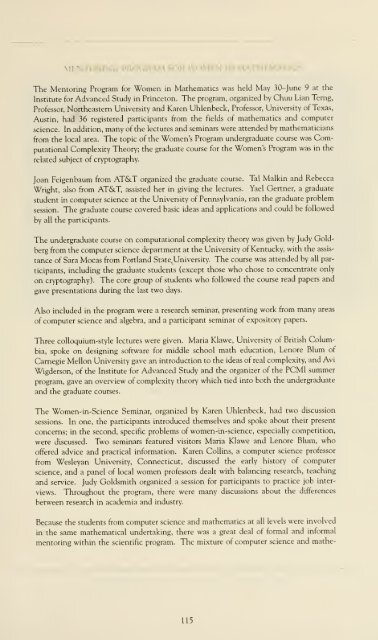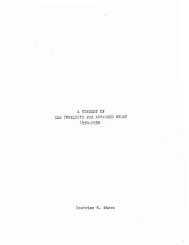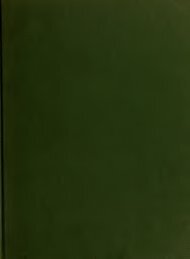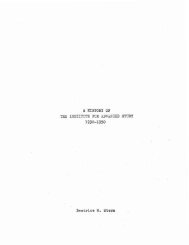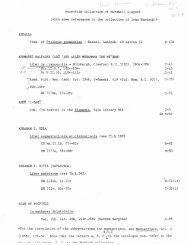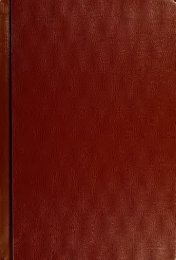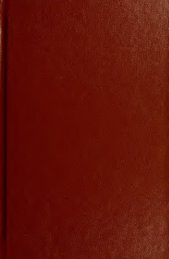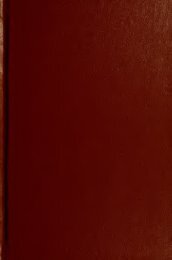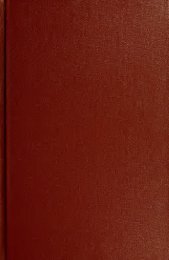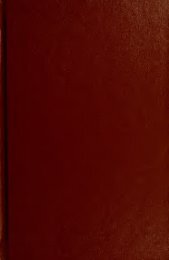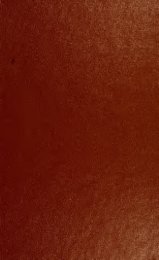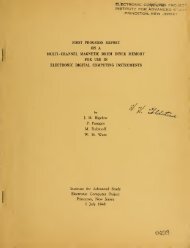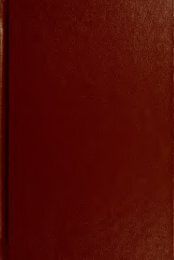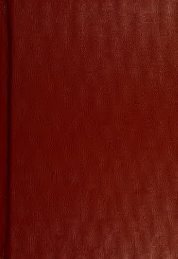Report for the academic year - Libraries - Institute for Advanced Study
Report for the academic year - Libraries - Institute for Advanced Study
Report for the academic year - Libraries - Institute for Advanced Study
Create successful ePaper yourself
Turn your PDF publications into a flip-book with our unique Google optimized e-Paper software.
The Mentoring Program <strong>for</strong> Women in Ma<strong>the</strong>matics was held May 30-June 9 at <strong>the</strong><br />
<strong>Institute</strong> <strong>for</strong> <strong>Advanced</strong> <strong>Study</strong> in Princeton. The program, organized by Chuu Lian Terng,<br />
Professor, Nor<strong>the</strong>astern University and Karen Uhlenbeck, Professor, University of Texas,<br />
Austin, had 36 registered participants from <strong>the</strong> fields of ma<strong>the</strong>matics and computer<br />
science. In addition, many of <strong>the</strong> lectures and seminars were attended by ma<strong>the</strong>maticians<br />
from <strong>the</strong> local area. The topic of <strong>the</strong> Women's Program undergraduate course was Com-<br />
putational Complexity Theory; <strong>the</strong> graduate course <strong>for</strong> <strong>the</strong> Women's Program was in <strong>the</strong><br />
related subject of cryptography.<br />
Joan Feigenbaum from AT&T organized <strong>the</strong> graduate course. Tal Malkin and Rebecca<br />
Wright, also from AT&T, assisted her in giving <strong>the</strong> lectures. Yael Gertner, a graduate<br />
student in computer science at <strong>the</strong> University of Pennsylvania, ran <strong>the</strong> graduate problem<br />
session. The graduate course covered basic ideas and applications and could be followed<br />
by all <strong>the</strong> participants.<br />
The undergraduate course on computational complexity <strong>the</strong>ory was given by Judy Gold-<br />
berg from <strong>the</strong> computer science department at <strong>the</strong> University of Kentucky, with <strong>the</strong> assis-<br />
tance of Sara Mocas from Portland State.University. The course was attended by all par-<br />
ticipants, including <strong>the</strong> graduate students (except those who chose to concentrate only<br />
on cryptography). The core group of students who followed <strong>the</strong> course read papers and<br />
gave presentations during <strong>the</strong> last two days.<br />
Also included in <strong>the</strong> program were a research seminar, presenting work from many areas<br />
of computer science and algebra, and a participant seminar of expository papers.<br />
Three colloquium-style lectures were given. Maria Klawe, University of British Colum-<br />
bia, spoke on designing software <strong>for</strong> middle school math education, Lenore Blum of<br />
Carnegie Mellon University gave an introduction to <strong>the</strong> ideas of real complexity, and Avi<br />
Wigderson, of <strong>the</strong> <strong>Institute</strong> <strong>for</strong> <strong>Advanced</strong> <strong>Study</strong> and <strong>the</strong> organizer of <strong>the</strong> PCMI summer<br />
program, gave an overview of complexity <strong>the</strong>ory which tied into both <strong>the</strong> undergraduate<br />
and <strong>the</strong> graduate courses.<br />
The Women-in-Science Seminar, organized by Karen Uhlenbeck, had two discussion<br />
sessions. In one, <strong>the</strong> participants introduced <strong>the</strong>mselves and spoke about <strong>the</strong>ir present<br />
concerns; in <strong>the</strong> second, specific problems of women-in-science, especially competition,<br />
were discussed. Two seminars featured visitors Maria Klawe and Lenore Blum, who<br />
offered advice and practical in<strong>for</strong>mation. Karen Collins, a computer science professor<br />
from Wesleyan University, Connecticut, discussed <strong>the</strong> early history of computer<br />
science, and a panel of local women professors dealt with balancing research, teaching<br />
and service. Judy Goldsmith organized a session <strong>for</strong> participants to practice job inter-<br />
views. Throughout <strong>the</strong> program, <strong>the</strong>re were many discussions about <strong>the</strong> differences<br />
between research in academia and industry.<br />
Because <strong>the</strong> students from computer science and ma<strong>the</strong>matics at all levels were involved<br />
in <strong>the</strong> same ma<strong>the</strong>matical undertaking, <strong>the</strong>re was a great deal of <strong>for</strong>mal and in<strong>for</strong>mal<br />
mentoring within <strong>the</strong> scientific program. The mixture of computer science and ma<strong>the</strong>-<br />
115


